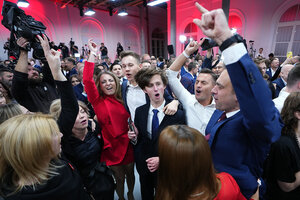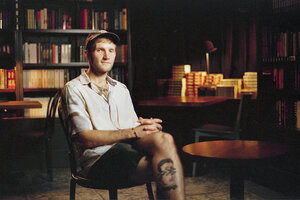Young Poles led a political revolution. Now they need to learn patience.

Supporters of Donald Tusk celebrate his election victory last October at his party headquarters. Younger Poles helped him win.
Petr David Josek/AP
Warsaw, Poland
Life in Poland is finally moving in the right direction, says Łukasz Dryżałowski.
The Warsaw-based engineer-turned-filmmaker helped rally friends and strategize how and where to vote six months ago, in an election that saw 69% of Poles under 30 turn out to vote. That youth mobilization, which surpassed even Poland’s communism-toppling election of 1989, proved crucial to ousting the conservative Law and Justice Party.
During their eight years in office, Law and Justice raised social insurance payments which particularly impacted younger Poles like the 32-year-old Mr. Dryżałowski, rolled back civil rights including access to abortion, quashed media and judiciary independence, angered the European Union, and oversaw skyrocketing costs, including apartment prices.
Why We Wrote This
Six months ago, young Poles made a statement by helping to vote out eight years of backsliding conservative rule. But will their enthusiasm persist as the new coalition deals with the grinding realities of governance?
But now that Prime Minister Donald Tusk and his coalition are in office, even if it’s only been a few months, Mr. Dryżałowski feels that a difference has been made.
“It’s not like we will wake up tomorrow and everything will go back to some kind of normal,” he says. The coalition “hasn’t done anything on abortion rights yet, and it’s been 200 days since election. It should have happened by now. But there is a guarantee that we will stay in the European Union. They’ve stopped any kind of ‘Polexit’ signals.”
But now that Law and Justice has been relegated to the opposition, the enthusiasm younger Poles carried leading up to the election now runs the risk of ebbing; Mr. Dryżałowski himself has warned of “burnout.” Experts say that their engagement – or disengagement – comes at a critical time for Poland’s democracy, as it tries to rebound from the backsliding under Law and Justice’s tenure.
“They voted and felt like ‘I’m a good citizen,’ but you have to do more, to engage, not only in political parties but within nongovernmental organizations, and to be active on social media,” says Adam Kądziela, a political analyst.
A new era of civic participation?
Learning to live inside of a democracy takes education.
After the fall of communism in 1989, Poland began a peaceful building of a modern democratic system. But becoming an active participant in that system doesn’t happen overnight, says Dr. Kądziela, author of the report, “The Political Portrait of Young Poles 2023.”
Participation needs to be taught in schools, woven into the social fabric, and propagated via civic institutions such as the media, says Dr. Kądziela, and it was a slow, evolving process. “Our parents’ generation lived under a communist regime, so we didn’t know how to build our democratic competencies,” he says. “We’d lost the current young generation between ages 18 and 38” to apathy.
An inherent distrust of the state has been woven into Polish society over centuries of struggle against a monarchy or a centralized power. Then came the modern communist era, which perpetuated that feeling of “the state as almost a sort of oppressive outside power,” says Helena Chmielewska-Szlajfer, a sociologist and assistant professor at Kozmiński University.
“So you have this fascinating paradox in Poland of intuitive, actual civic practice which was unofficial” because organizing was dangerous during the communist era, she says, “coupled with a historic distrust of institutions. People trust other people, but not necessarily institutions.”
That’s why October’s youth turnout is a possible indication of a new era of civic participation via government institutions. “Change was the biggest motivation. Young people were frustrated,” Dr. Kądziela says, pointing to record levels of inflation felt more keenly by young working people.
As the election approached, Mr. Dryżałowski made promotional films for a progressive party as a contractor and drove to a less-progressive district to cast his vote, calculating he’d have more impact there. “I called my friends, we went to vote, and we did it,” ousting Law and Justice, he says.
Michał Kiedrzyński, a 21-year-old computer science student, voted for the first time in October. He’d been activated by worries about Poland’s direction. “People in my bubble were generally upset about all kinds of things,” says Mr. Kiedrzyński.
These young people are part of a broader generational change, says Dr. Chmielewska-Szlajfer. “Poland is a very unique country in the sense that it’s dynamic, and in the way people understand and do democracy. We’ve been doing a super fast-forward, making up for decades that we were behind the Iron Curtain.”
Or a “one-time mobilization”?
Yet Polish politics is less than inspiring for young people. For the past two decades the political scene has largely revolved around two men - Donald Tusk, now 66 as he starts his second stint as prime minister, and Jarosław Kaczyński, the Law and Justice leader who is now 74. The average member of parliament is in their 50’s.
And that’s been anathema to young Poles. In most elections they’ve been less engaged and hold less sway than graying Poles, say pollsters.
Klaus Bachmann, a historian at SWPS University of Social Sciences and Humanities in Warsaw, thinks the October vote was a “one-time mobilization,” he says. “I don’t think this means they really want to engage in politics. Politics is kind of repellent for young people, and they will wait to see what the new government is doing and if they like it.”
Karolina Jakubczyk, a 22-year-old recruiter, exemplifies a strong sense of civic duty as well as the risk of ebbing enthusiasm. She wants a more modern and less old-fashioned Poland, and points out that an aging society should have more young people in charge.
Yet she doesn’t have the “patience” to run for office herself. And, after an initial post-election spurt of interest in parliamentary proceedings on television, she ultimately tuned out. “The politicians were comical; it wasn’t worth following anymore,” she says. “I was turned off.”
Mr. Dryżałowski, the filmmaker, says he’s not necessarily more engaged either. “For now, I got what I wanted, and now I have to wait and see where things go.”
He wouldn’t mind some help with housing, which Mr. Tusk’s coalition hasn’t yet tackled. He and his girlfriend have been searching for a flat to buy for months, in a housing situation so dire that two thirds of young Poles live with or get financial help from their parents.
“We’re still looking.”
Piotr Żakowiecki contributed to this report.


